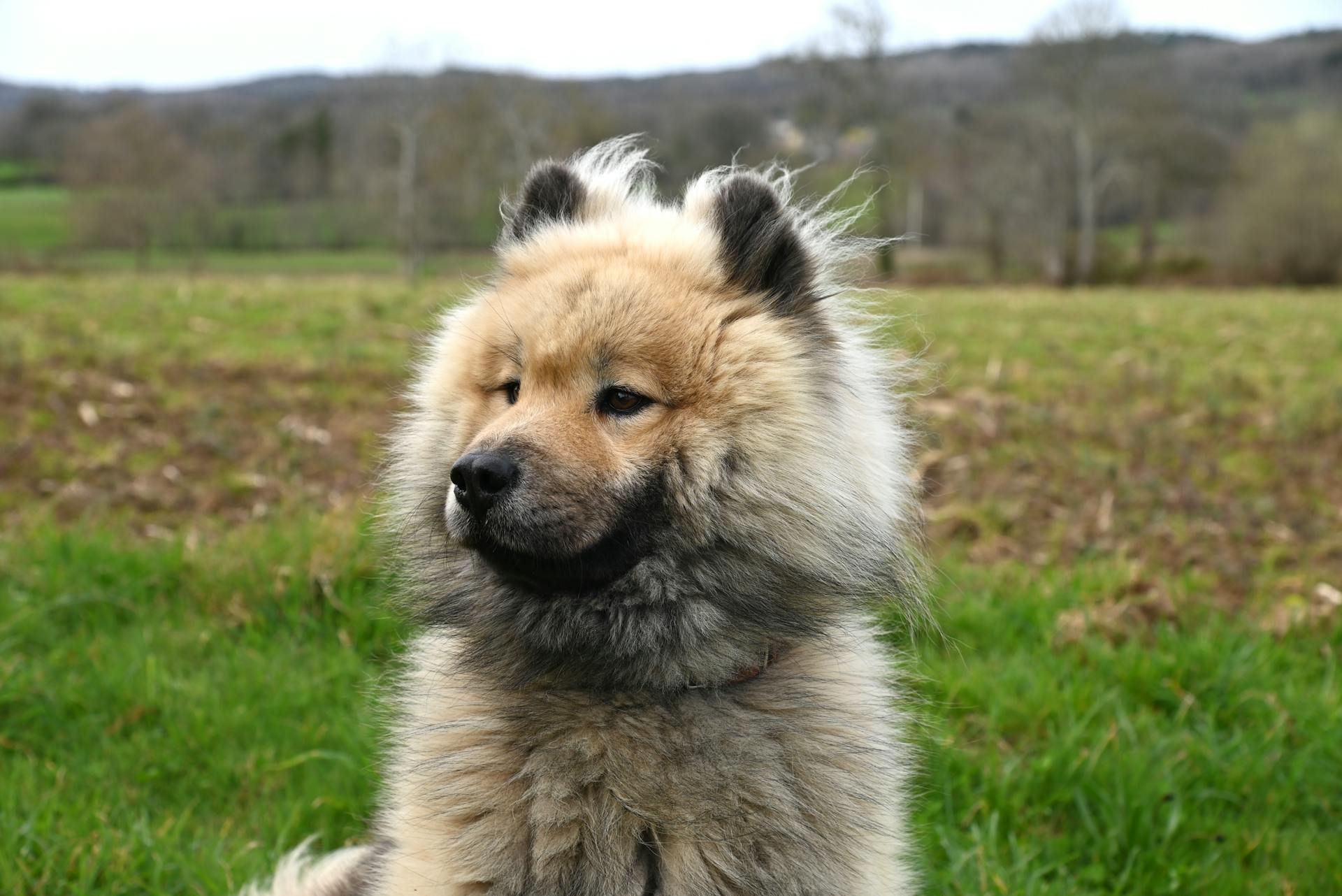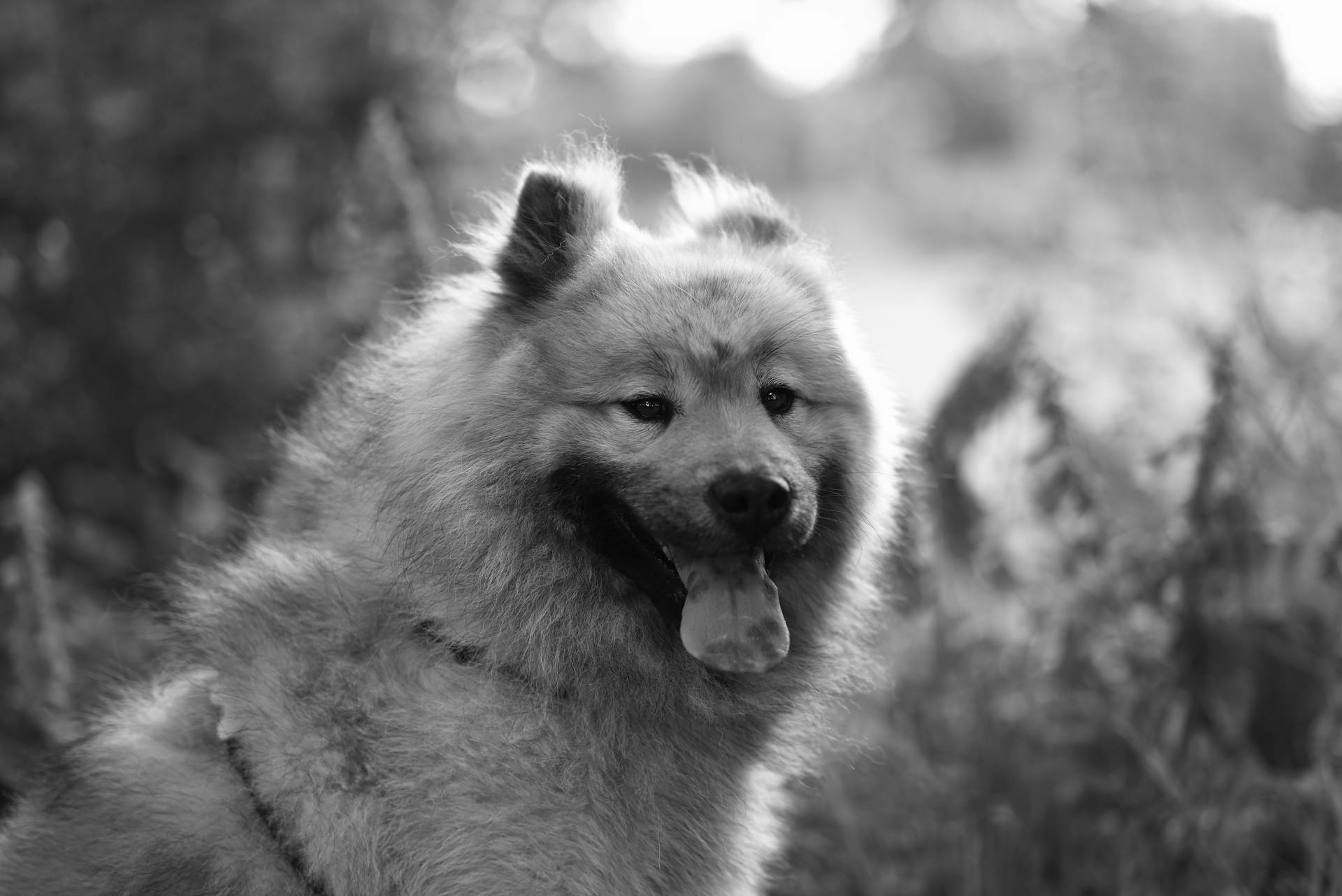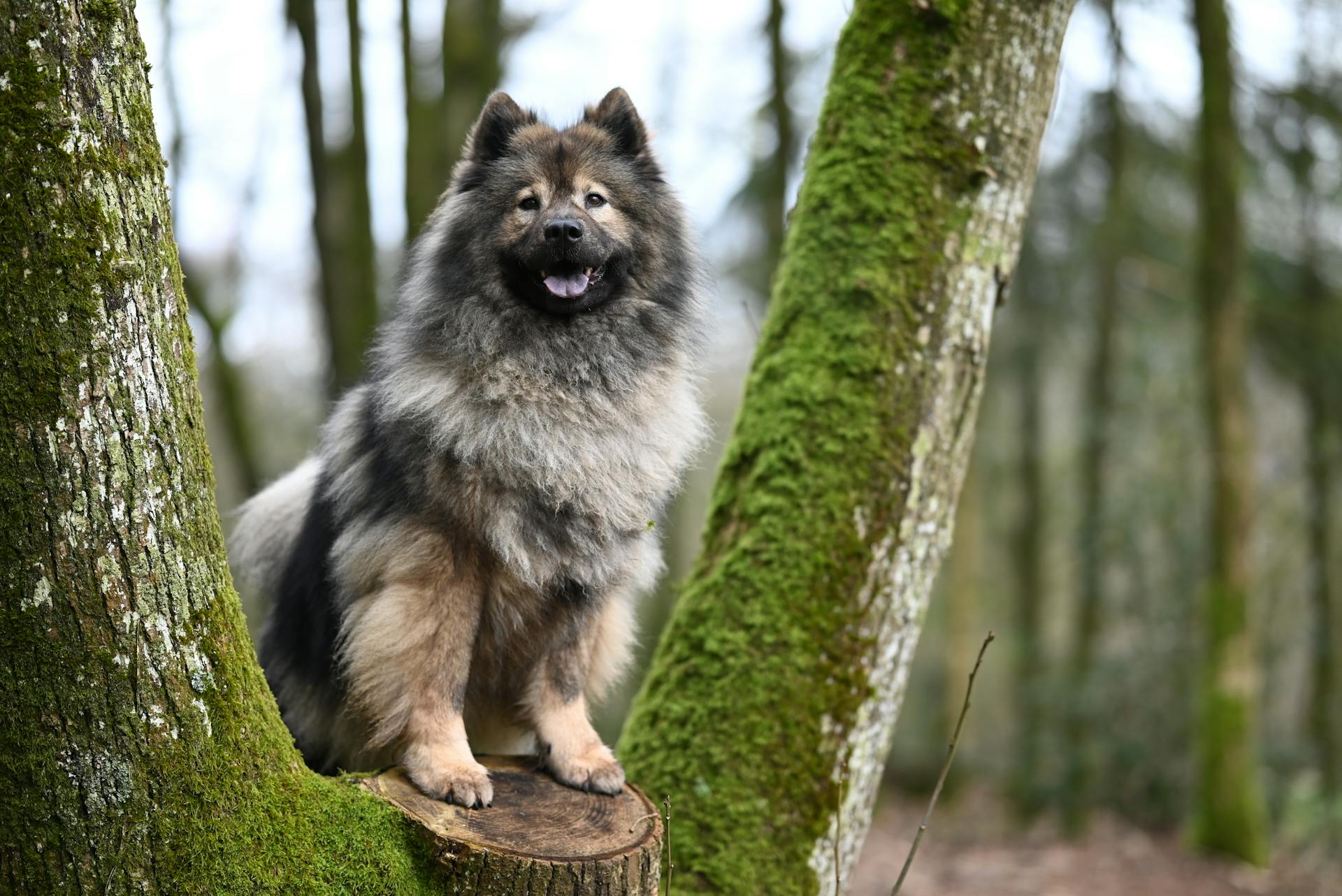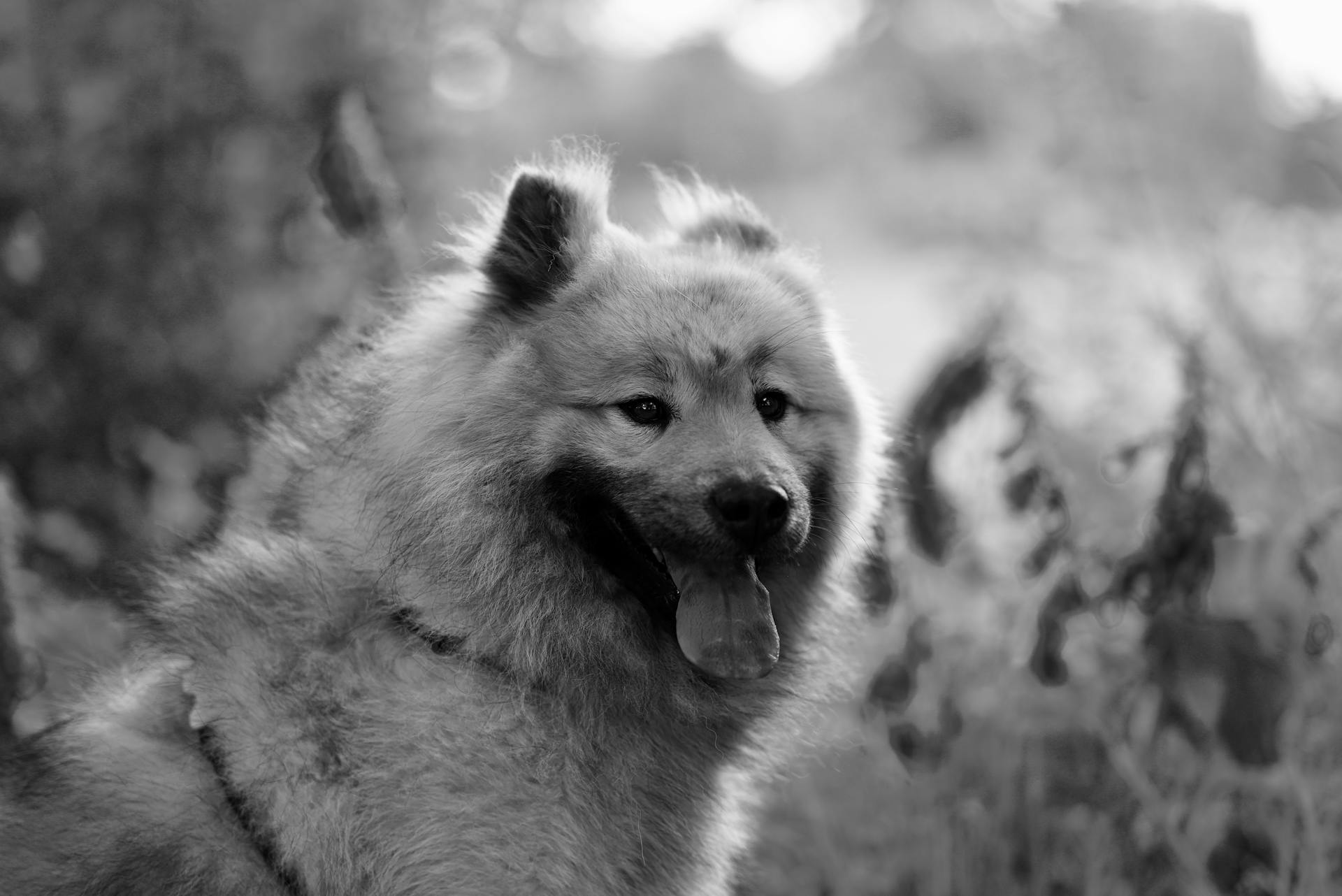
Eurasier puppies are a unique breed that originated in Germany in the 1960s. They were developed by crossing a Samoyed with a Wolfspitz and a Chow Chow.
Their thick coats require regular grooming to prevent matting and tangling, which can be a challenge for new owners. This breed sheds heavily, especially during shedding season.
Eurasier puppies are generally quiet and calm, but they do need regular exercise to stay happy and healthy. A daily walk and playtime should be a priority for any Eurasier owner.
Their intelligence and loyalty make them easy to train, but consistency and patience are key. Eurasier puppies thrive on positive reinforcement and clear boundaries.
You might like: Eurasier Colors
Health and Care
Eurasier puppies are generally healthy, but they may inherit health conditions from their parent breeds. With proper care and regular veterinary checkups, many of these potential issues can be managed effectively.
Hip dysplasia, patellar luxation, hypothyroidism, and eye problems are some of the health concerns to be aware of. Regular veterinary check-ups can help identify and address these underlying issues.
To ensure your Eurasier's well-being, regular veterinary check-ups are essential. Your veterinarian can assist in creating a tailored care routine that promotes their overall health.
Here are some common health problems that can affect Eurasiers:
- Hip Dysplasia: Lameness may occur with this condition if the dog's hip joints are not developed properly.
- Elbow Dysplasia: The dog's forelimbs will be affected by malformed joints.
- Patella Luxation: This condition results in the dog's knee caps slipping out of the grooves.
- Hypothyroidism: The dog may not produce enough thyroid hormones which will require medication for life.
- Missing Teeth: This breed is prone to naturally missing a few non-essential teeth.
- Distichiasis: This condition results in the abnormal growth of an errant or a double row of eyelashes.
Health and Care
Eurasiers are generally healthy dogs, but like all purebred dogs, they can inherit health issues from their parent breeds. They may be prone to hip dysplasia, patellar luxation, hypothyroidism, and eye problems.
Regular veterinary check-ups are essential to identify and address any underlying health issues. Your veterinarian can help create a tailored care routine to promote your Eurasier's overall health.
Eurasiers have a thick coat that sheds heavily, especially during intense shedding periods lasting about three weeks, occurring once or twice a year. To manage this, regular brushing and warm baths are recommended, followed by blow-drying on a low heat setting.
Daily ear checks are crucial to remove debris and check for pests. Keeping their nails trimmed once or twice a month, with the help of a groomer if needed, prevents them from clicking loudly on the floor.
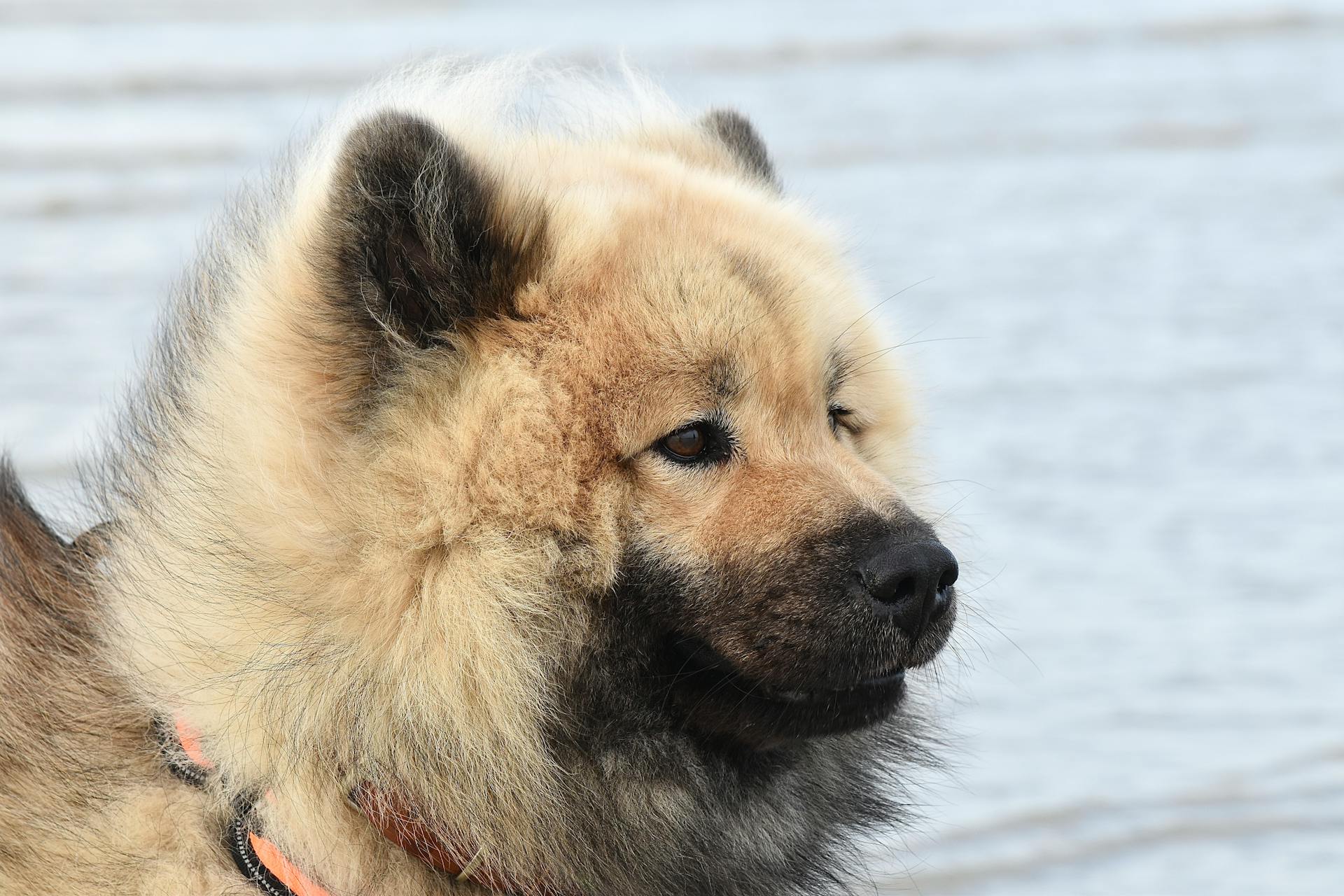
A daily 30- to 60-minute walk and some indoor or backyard playtime are necessary to fulfill their exercise needs. Eurasiers appreciate daily interaction and can become unhappy if left alone for too long.
Eurasiers are prone to certain inherited conditions, including hip dysplasia, elbow dysplasia, patella luxation, hypothyroidism, missing teeth, and distichiasis. Testing adult dogs before breeding can help minimize the appearance of these genetic issues.
Here are some common health issues to be aware of in Eurasiers:
- Hip dysplasia
- Patellar luxation
- Hypothyroidism
- Eye problems
- Elbow dysplasia
- Missing teeth
- Distichiasis
It's essential to consult with a veterinarian to determine the best diet for your Eurasier, as their nutritional needs depend on their life stage, activity level, and current health condition.
Diet and Nutrition
Eurasiers are light eaters and some are even picky, so it's essential to feed them measured meals twice a day rather than leaving food out all the time.
Their controlled eating habit means they rarely overindulge, and they display a delicate approach when taking food by hand.
Suggestion: Puppys Food
To determine the perfect diet for your Eurasier, consult your veterinarian, as each individual can vary significantly in terms of weight, energy levels, and overall health.
Your breeder or veterinarian can recommend a good dog food for your Eurasier, as well as how much to feed, so be sure to ask for their expert advice.
Eurasiers often do well with eating complete and balanced meals developed by reputable dog food brands, but active lifestyles may require high-protein diets to sustain them.
Additional reading: Shikoku Dog Puppy
Grooming and Appearance
Eurasier puppies are born with a thick double coat that's a mix of their Chow Chow and Wolfspitz ancestors. Their coats come in a variety of colors including black, black and tan, fawn, red, and wolf sable.
Eurasiers are relatively allergy-friendly, making them great companions for many people. They have a soft, dense undercoat and a fluffier, rougher topcoat that requires regular brushing.
Brushing your Eurasier's coat every day or every other day during shedding season can help manage shedding and reduce loose hair around the house. Outside of shedding season, weekly brushing with a pin brush or slicker brush is usually enough.
Eurasiers are naturally clean dogs that rarely have a doggy odor. They only need baths when they start to smell or get exceptionally dirty from playing outdoors. Overbathing can lead to skin and coat issues.
Eurasiers rely on their coats to regulate their body temperature and protect their skin from sunburn. Never shave your Eurasier's coat, as it can permanently damage their coat and make them hotter in the sun.
Brushing once a week is sufficient for most Eurasiers, but during shedding season, daily or every other day brushing may be necessary. Some people think long-haired dogs shed a lot, but the truth is, they actually shed much less than short-haired dogs.
Eurasiers come in a wide variety of colors, including red, cream, wolf-grey, black and tan, solid black, and many variations in between. Each Eurasier is unique, making them extra special.
Temperament and Personality
Eurasier puppies are known for their calm and well-balanced temperament, making them a great fit for families.
They are deeply family-oriented dogs, preferring to have a companion most of the time, and can become anxious and melancholic if left alone for too long.
Eurasiers are naturally wary of strangers and have a loud bark, making them good watchdogs, but they're not aggressive and will approach new people with caution.
They thrive in families that include them in all the action, and enjoy activities like camping trips and weekend excursions with their family.
Eurasiers are highly adaptable and love doing whatever the family is doing, but they can't be kept in kennels or as outside dogs, as they need close contact with their families.
Here are some key temperament traits of Eurasier puppies:
Getting Started in Dog Sports
Eurasiers are naturally athletic and enjoy being part of the action, making them a great fit for dog sports.
If you're new to dog sports, consider starting with a beginner-friendly activity like agility training or obedience classes.
Broaden your view: Chinook Dog Puppy
Eurasiers have a strong work ethic and are fast learners, so they'll pick up new skills quickly.
To get started, you'll need to choose a dog sport that suits your Eurasier's personality and abilities.
Some popular dog sports include agility, obedience, and search and rescue training.
Eurasiers are well-suited for working as therapy dogs, military dogs, and search and rescue dogs due to their strong protective instincts and high trainability.
Consider enrolling in a mixed-breed dog sports program to find a community and learn from experienced trainers.
Here are some dog sports to consider:
- Agility training
- Obedience classes
- Search and rescue training
- Therapy dog work
Remember to socialize your Eurasier early and often to help them develop good behavior in new situations.
Temperament & Intelligence
Eurasiers are highly adaptable dogs that thrive on being part of the family action. They love doing whatever the family is doing, making them the perfect companion.
Their intelligence and loyalty make them quick learners, and they pick up new skills and tricks with ease. They're excellent candidates for service dog work, therapy dogs, military dogs, and search and rescue dogs.
In terms of energy level, Eurasiers maintain a moderate to fair level, relishing daily walks but not being overly active or hyperactive. They're not barkers, unlike some spitz breeds, and their calm nature makes them a great addition to families with children.
Early socialization is crucial for Eurasiers, as they can become timid and withdrawn if not exposed to different social situations and environments. They form strong bonds with their families and can be reserved with strangers, but they're not aggressive.
Here are some key characteristics of Eurasiers:
Eurasiers are loving, tolerant, and patient with children and other pets, making them a great addition to families. They're intuitive and intelligent, and their calm nature makes them a great companion.
Size and Space
Eurasier puppies are a great choice for many families, but one thing to consider is their size and space needs.
Eurasiers typically weigh between 40 to 70 pounds, so they're not too big, but still need room to move around.
The ideal living space for an Eurasier is a house with a yard, as they need regular exercise and space to run around.
Males range between 50-70 pounds and have a shoulder height between 20.5 to 23.5 inches, while females range between 40-60 pounds with a shoulder height between 19 to 22 inches.
Eurasiers are a strong and sturdy breed, so they need a sturdy home to match their energy level.
A yard with a secure fence is a must, as Eurasiers can be prone to wandering off if they get the chance.
Overall, Eurasier puppies are a great choice for active families who have the space and time to devote to their new furry friend.
Family and Pets
Eurasier puppies are natural companions for children of all ages, especially if they grow up together. They're generally calm and even-tempered, making them an excellent choice for families.
However, Eurasiers can be reserved around strangers, so it's essential for children to learn how to approach and interact with them properly. They need to understand that gentle handling and respecting their personal space is key.
Introducing Eurasier puppies to other pets requires patience and time. They may take a while to warm up to unfamiliar dogs and other pets, but with proper socialization, they can eventually coexist peacefully.
It's crucial to teach children how to interact with Eurasiers in a respectful manner, including handling them gently and avoiding sensitive areas. They should also know when a Eurasier wants to be left alone and respect their boundaries.
Eurasiers can be choosy with dogs, so introducing a new dog to their home should be done gradually. With time and patience, they can consider new dogs as part of the family and live harmoniously together.
Eurasiers have a knack for understanding children and often make good playmates. However, they may not be as patient with other children outside of their families, so it's essential to give them their space and provide a quiet area for them to retreat to.
Recommended read: Introducing Puppy to Other Dogs
Rescue and Purchase
If you're set on bringing a Eurasier puppy into your life, be prepared for a wait. The United States Eurasier Club publishes a list of breeders on its website, but there are currently less than 10 breeders in the U.S.
You'll likely be put on a waiting list for a puppy, and expect to pay on average between $1,000 to $2,500 for a puppy from a breeder.
Quick Facts and Tips
The Eurasier is a wonderful breed, and if you're considering bringing one home, here are some quick facts to keep in mind.
Eurasiers are relatively small dogs, with males reaching 23-27 inches at the shoulder and females reaching 20-24 inches. They typically weigh between 55-75 pounds for males and 45-60 pounds for females.
If you're planning to bring an Eurasier puppy home, you'll want to make sure you have plenty of time for exercise and training. They need at least 30-60 minutes of exercise per day, and they respond well to positive reinforcement training.
Here's a quick rundown of the breed's size and weight ranges:
Overall, Eurasiers are friendly, playful, intelligent, and independent dogs that make great companions for active families.
Quick Facts
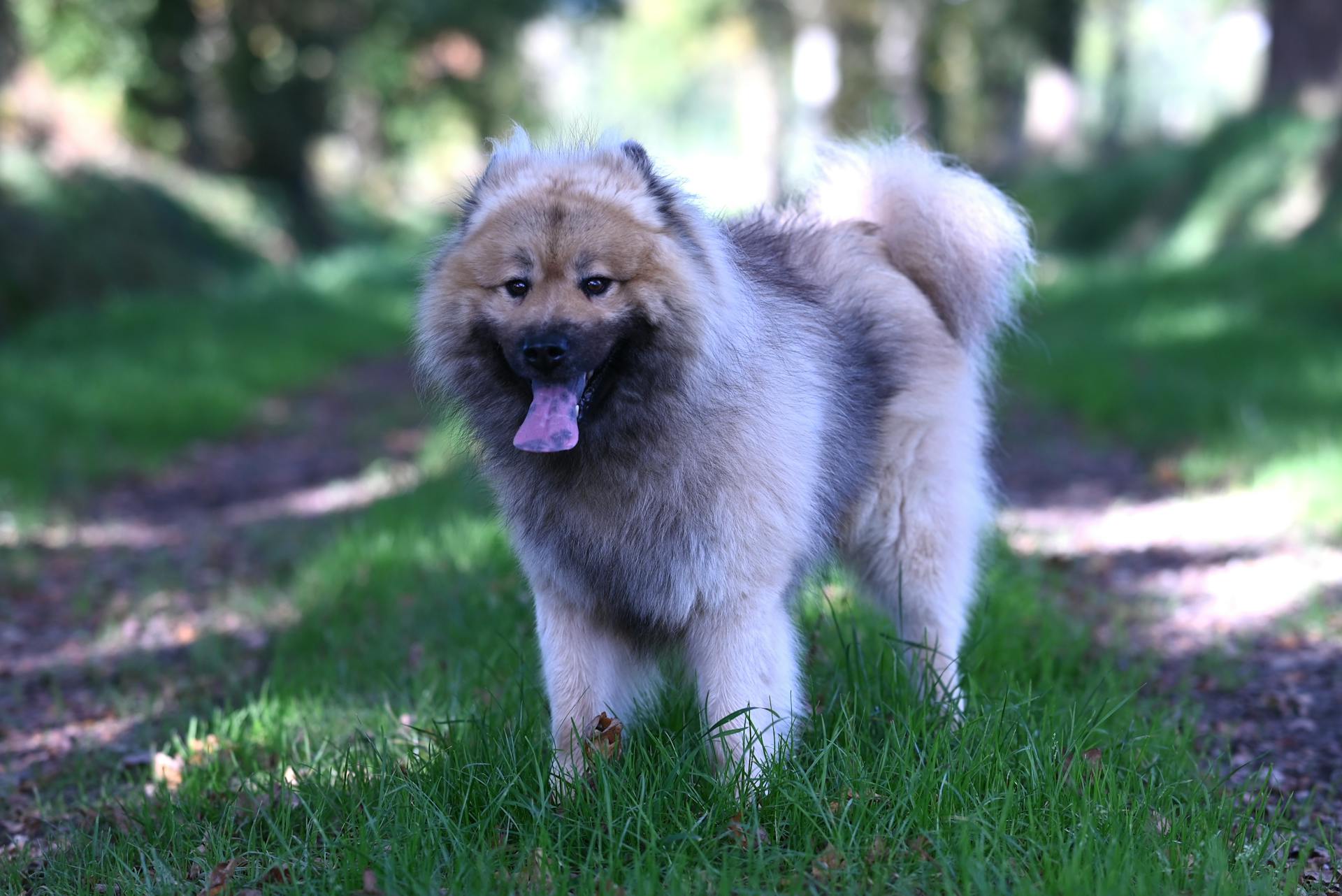
The Eurasier breed is a unique and fascinating one. It originated in Germany.
The Eurasier's size can vary, but on average, males reach 23-27 inches (58-69 cm) at the shoulder, while females reach 20-24 inches (51-61 cm).
This breed's weight is also notable, with males typically weighing between 55-75 pounds (25-34 kg) and females weighing between 45-60 pounds (20-27 kg).
The Eurasier is classified as a Non-sporting breed group.
With proper care, Eurasiers can live for 12-15 years.
Their coat is a standout feature, consisting of a long, thick outer coat and a soft, dense undercoat that requires regular brushing.
In terms of temperament, Eurasiers are known for being friendly, playful, intelligent, and independent.
To keep an Eurasier happy and healthy, aim for 30-60 minutes of exercise per day.
Training an Eurasier is relatively easy, especially with positive reinforcement techniques.
Here's a breakdown of the Eurasier's grooming needs:
- Weekly brushing to prevent matting and tangling
- Occasional baths as needed to keep their coat clean
Some common health issues in Eurasiers include hip dysplasia, elbow dysplasia, and eye problems, so be sure to monitor their health closely.
3 Little-Known Facts
Here are three little-known facts that might surprise you:
The average person spends around 4 months of their lifetime waiting in lines, which can add up to a significant amount of time.
You can save time by using the "dual-check" method when sending emails, which involves checking your message for clarity and accuracy before hitting send. This simple trick can help you avoid embarrassing typos and misunderstandings.
The most productive people often use the "Pomodoro Technique", which involves working in focused 25-minute increments, followed by a 5-minute break.
Not Recognized by AKC
Eurasiers aren't officially recognized by the AKC, which can make things a bit tricky for US breeders and owners.
Currently, Eurasiers are registered with other international dog breed clubs, which is a good thing because it means they're still getting the recognition they deserve.
The AKC does have a category called Foundation Stock Service, and Eurasiers are listed under this category, which means they can work towards official recognition.
Eurasier breeders in the US currently use the FCI Breed Standards for their dogs, which is a good resource to have when it comes to understanding the breed's characteristics and traits.
For your interest: Eurasier Breeders
Featured Images: pexels.com
